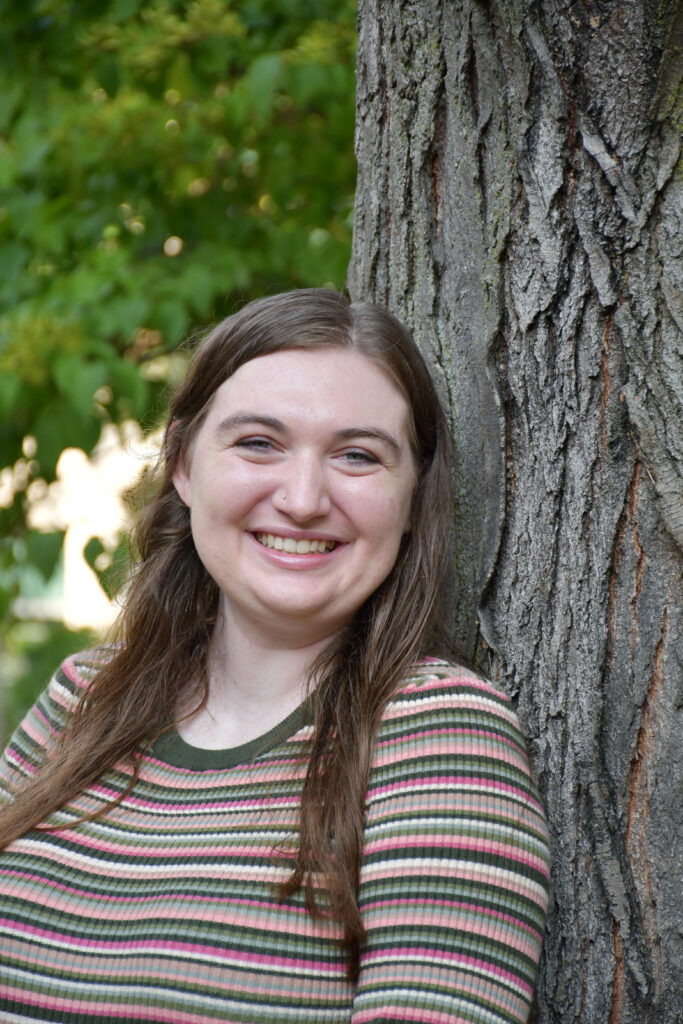Called to Be Church in the World
September 24, 2024
An Interview with Allison Martin MDiv/MAPCC ‘28

A call to ministry is rarely convenient. Indeed, Allison Martin’s life is testimony that the divine voice has power to draw us toward uncertain futures when conviction in that holy love outweighs our hesitation. Now starting as a dual-degree student in the MDiv/MAPCC programs, they are pursuing ordination as a deacon in the United Methodist Church in combination with a career as a licensed counselor. Just four years ago, however, they weren’t sure if there was a place for them within the denomination. “I’m a nonbinary lesbian, so the 2019 General Conference was a really painful experience,” they say. “But I felt this pull to come back.”
After the United Methodist Church voted five years ago to prohibit LGBTQIA+ people from serving in ministry, Allison joined an affirming PC(USA) student ministry, but their heart never left the Wesleyan tradition. “I grew up in the Methodist Church, it’s where I claimed my faith as my own,” they say. “My church was there for me when I came out in high school, my youth group was the only place where I felt safe as a queer person.” So, Allison accepted enrollment at Garrett last year before the ban was overturned in April. “I applied to pursue ordination as a deacon before I knew that it would even be possible for me” they confide. “I knew how good church can be because of this denomination so I knew that there was hope for the denomination.”
Now, the way is blessedly clear, and they have their sights set squarely on transformative ministry of care and compassion. “One thing I love about deacons is that they can proclaim good news through what they do and not just through what they say,” Allison shares. “I don’t feel called to preach or necessarily lead a congregation, but I do feel called to be the church in the world.” To move toward that goal, they are also seeking licensure in clinical counseling. “I think about deacons as a bridge between the church and the world,” they say, “And I feel really drawn to that work because so much of my community has been harmed by Christianity and is not involved in churches.”
As this calling crystallized, it became clear that Garrett was where they needed to study. “One thing I wanted from a counseling program is more than just Western conceptions of healing, and Garrett’s MAPCC program does such a good job of integrating different modalities into spiritual care and counseling,” they say. “It’s not pathologizing and cares for the whole person.” Guided by professors like Dr. AHyun Lee, Dr. Esther Acolatse and Dr. Rolf Nolasco, international perspectives bring distinctive focus to the MAPCC program, as does an emphasis on trauma-informed care. “I would be doing a disservice to my future clients if I didn’t go to a program that included those perspectives in their curriculum,” Allison says. “I must be able to care for different kinds of people. But also, people heal the best when they know they’re loved in community.”
Allison’s own story attests to this truth. After pain and conflict, they are claiming their place within the faith tradition that helped them feel whole. “Things like the Wesleyan quadrilateral are the reason I’m still able to call myself a Christian,” they confess. “It felt reckless to come back, but also like it was my only option because I’ve dreamed of being a deacon and a counselor my whole life.” In their words, you can hear potent belief in the connection between individual and communal healing. “I’m called to be a presence for people in crisis and a witness. If you’re a Christian, you’re supposed to make it on Earth as it is in heaven.”

